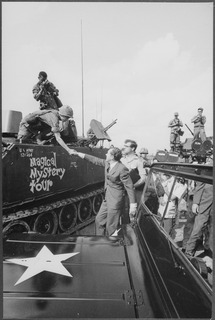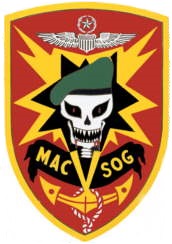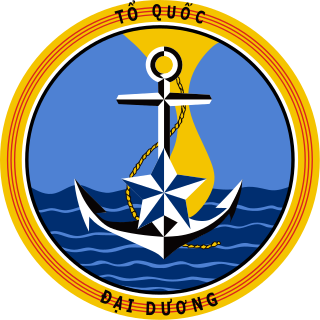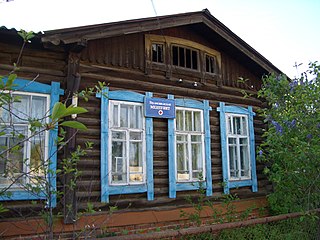
Agent Orange is a herbicide and defoliant chemical, one of the "tactical use" Rainbow Herbicides. It is widely known for its use by the U.S. military as part of its herbicidal warfare program, Operation Ranch Hand, during the Vietnam War from 1961 to 1971. It is a mixture of equal parts of two herbicides, 2,4,5-T and 2,4-D. In addition to its damaging environmental effects, traces of dioxin found in the mixture have caused major health problems for many individuals who were exposed.

A Vietnam veteran is someone who served in the armed forces of participating countries during the Vietnam War.
Military Assistance Advisory Group (MAAG) is a designation for United States military advisers sent to other countries to assist in the training of conventional armed forces and facilitate military aid. Although numerous MAAGs operated around the world throughout the 1940s–1970s, the most famous MAAGs were those active in Southeast Asia before and during the Vietnam War. Typically, the personnel of MAAGs were considered to be technical staff attached to, and enjoying the privileges of, the US diplomatic mission in a country. Although the term is not as widespread as it once was, the functions performed by MAAGs continue to be performed by successor organizations attached to embassies, often called United States Military Groups. The term MAAG may still occasionally be used for such organizations helping promote military partnerships with several Latin American countries such as Peru and the Dominican Republic as well as in African countries such as Liberia.

Vietnamization was a policy of the Richard Nixon administration to end U.S. involvement in the Vietnam War through a program to "expand, equip, and train South Vietnamese forces and assign to them an ever-increasing combat role, at the same time steadily reducing the number of U.S. combat troops." Brought on by the Viet Cong's Tet Offensive, the policy referred to U.S. combat troops specifically in the ground combat role, but did not reject combat by the U.S. Air Force, as well as the support to South Vietnam, consistent with the policies of U.S. foreign military assistance organizations. U.S. citizens' mistrust of their government that had begun after the offensive worsened with the release of news about U.S. soldiers massacring civilians at My Lai (1968), the invasion of Cambodia (1970), and the leaking of the Pentagon Papers (1971).

Civilian Irregular Defense Group program was a program developed by the U.S. government in the Vietnam War to develop South Vietnamese irregular military units from minority populations.

Military Assistance Command, Vietnam – Studies and Observations Group (MACV-SOG) was a highly classified, multi-service United States special operations unit which conducted covert unconventional warfare operations prior to and during the Vietnam War.

The Republic of Vietnam Navy was the naval branch of the South Vietnamese military, the official armed forces of the former Republic of Vietnam from 1955 to 1975. The early fleet consisted of boats from France. After 1955 and the transfer of the armed forces to Vietnamese control, the fleet was supplied from the United States. With assistance from the U.S., the VNN became the largest Southeast Asian navy, with 42,000 personnel, 672 amphibious ships and craft, 20 mine warfare vessels, 450 patrol craft, 56 service craft, and 242 junks.

The Disabled American Veterans (DAV) is an organization created by the United States Congress for disabled military veterans of the United States Armed Forces that helps them and their families through various means. It currently has nearly 1.3 million members. As a 501(c)(4) social welfare organization, it is outside the purview of – and therefore not rated by – Charity Navigator.

The Technical Education and Skills Development Authority (TESDA) serves as the Philippines' Technical Vocational Education and Training (TVET) authority. As a government agency, TESDA is tasked to both manage and supervise the Philippines' Technical Education and Skills Development (TESD). Its goals are to develop the Filipino workforce with "world-class competence and positive work values" and to provide quality technical-educational and skills development through its direction, policies, and programs.

The Senang Hati Foundation, also known as Yayasan Senang Hati, is a non-profit organization in Bali that assists people living with disabilities. The name Senang Hati loosely translates as "Happy Hearts" in Indonesian. The foundation creates programmes to develop self-confidence, physical and economic independence, and increase awareness in the general community of the rights of people with disabilities. Senang Hati accomplishes this through the assistance of volunteers, who provide skills training and social interaction. The society also provides wheelchairs and housing, and runs Senang Hati Places, a home for disabled children.
Children of Vietnam is a humanitarian organization which helps poor and homeless children of the Da Nang area in Vietnam. The organization, established in 1998, is based in the United States.
Development Workshop (DW) is a non-profit organization providing assistance for poor and disadvantaged communities in the developing countries. Established in 1973. Works in more than 30 countries of Asia, Africa, the Americas.
The Rehabilitation Services Administration (RSA) is a federal agency under the United States Department of Education, Office of Special Education and Rehabilitative Services, and is headquartered within the Department of Education in Washington, D.C. It was established to administer portions of the Rehabilitation Act of 1973. Its mission is to provide leadership and resources to assist state and other agencies in providing vocational rehabilitation (VR) and other services to individuals with disabilities to maximize their employment, independence and integration into the community and the competitive labor market.
VNhelp is a non-profit and non-governmental organization which declares its aim to assist children, families, and communities in Vietnam and promote cultural contacts between Vietnam and USA. Founded in 1991 as The VietNam Health, Education and Literature Projects and based in the United States, the organization is operated by volunteers.
The Michigan State University Vietnam Advisory Group was a program of technical assistance provided to the government of South Vietnam as an effort in state-building by the US Department of State.
Vietnam is primarily a source country for women and children trafficked for commercial sexual exploitation and forced labor. Women and children are trafficked to the People’s Republic of China (P.R.C), Cambodia, Thailand, the Republic of Korea, Malaysia, Taiwan, and Macau for sexual exploitation. Vietnamese women are trafficked to the P.R.C., Taiwan, and the Republic of Korea via fraudulent or misrepresented marriages for commercial exploitation or forced labor. Vietnam is also a source country for men and women who migrate willingly and legally for work in the construction, fishing, or manufacturing sectors in Malaysia, Taiwan, P.R.C., Thailand, and the Middle East but subsequently face conditions of forced labor or debt bondage. Vietnam is a destination country for Cambodian children trafficked to urban centers for forced labor or commercial sexual exploitation. Vietnam has an internal trafficking problem with women and children from rural areas trafficked to urban centers for commercial sexual exploitation and forced labor. Vietnam is increasingly a destination for child sex tourism, with perpetrators from Japan, the Republic of Korea, the P.R.C., Taiwan, the UK, Australia, Europe, and the U.S. In 2007, an Australian non-governmental organization (NGO) uncovered 80 cases of commercial sexual exploitation of children by foreign tourists in the Sa Pa tourist area of Vietnam alone.

CORDS was a pacification program of the governments of South Vietnam and the United States during the Vietnam War. The program was created on 9 May 1967, and included military and civilian components of both governments. The objective of CORDS was to gain support for the government of South Vietnam from its rural population which was largely under the influence or controlled by the insurgent communist forces of the Viet Cong and the North Vietnamese People's Army of Vietnam (PAVN).
Vietnam Inland Waterways Administration is the government agency of the Ministry of Transport that governs and maintains the ports, rivers, canals and navigable lakes of Vietnam. The current General Director is Assistant Professor D., People's Teacher Trần Đắc Sửu; VIWA is located in Ha Noi.

The 1959 to 1963 phase of the Vietnam War started after the North Vietnamese had made a firm decision to commit to a military intervention in the guerrilla war in the South Vietnam, a buildup phase began, between the 1959 North Vietnamese decision and the Gulf of Tonkin Incident, which led to a major US escalation of its involvement. Vietnamese communists saw this as a second phase of their revolution, the US now substituting for the French.
Tim Aline Rebeaud is known for her charity work and for the foundation of the NGO Maison Chance in Vietnam. Maison Chance is a social structure helping street children, orphans, and disadvantaged and handicapped people in Vietnam. Aline Rebeaud was given the name "Tim" – "heart" in Vietnamese. Today, she has the dual citizenship, she is Swiss and Vietnamese. Her complete Vietnamese name is Hoang Nu Ngoc Tim.













